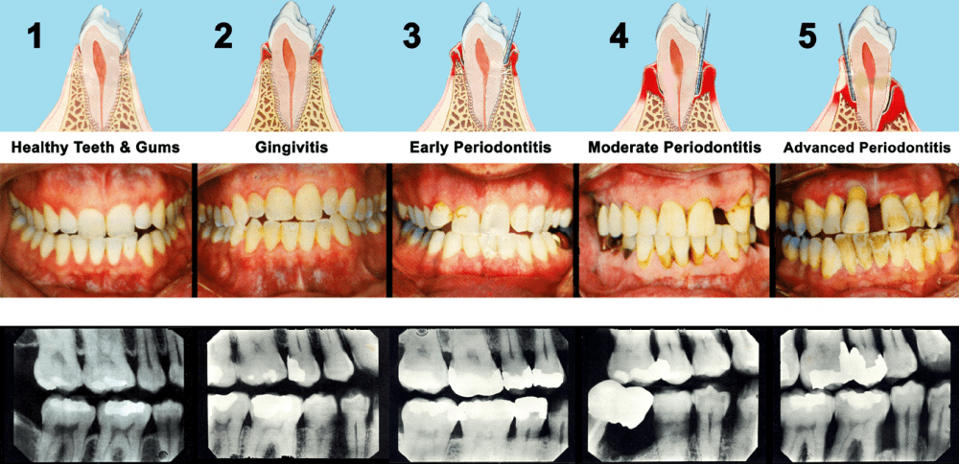Gum disease, also known as periodontal disease, is a common yet serious oral health condition that affects the gums and the surrounding tissues. It ranges from mild gingivitis to severe periodontitis. If left untreated, can lead to tooth loss and other health complications.
In this issue, we will discuss many aspects of the chronic public health menace commonly referred to as Periodontal Disease.
Signs and Symptoms:
• Gum Inflammation is one of the earliest signs of gum disease. This is characterized by red, swollen, or tender gums. Healthy gums should be pink and firm.
• Bleeding Gums: Bleeding during brushing or flossing is not normal and can indicate gum disease.
• Persistent Bad Breath: Bad breath that doesn’t improve with oral hygiene may be a sign of gum disease.
• Receding Gums: Gums that are pulling away from the teeth, making them appear longer, could indicate gum recession, a common symptom of periodontitis.
• Loose Teeth: Advanced gum disease can cause the supporting bone to deteriorate, leading to loose teeth or tooth loss.
• Pain while Chewing: Discomfort or pain while chewing can be a sign of gum disease, especially if accompanied by other symptoms.
Associated Risks:
Several factors increase the risk of developing gum disease:
• Poor Oral Hygiene: Inadequate brushing and flossing allow plaque to accumulate, leading to gum inflammation.
• Smoking: Tobacco use weakens the immune system and makes it harder for gums to heal.
• Genetics: Some individuals may be genetically predisposed to gum disease.
• Certain Medications: Some medications can reduce saliva flow or cause gum overgrowth, increasing the risk of gum disease.
• Health Conditions: Conditions like diabetes and autoimmune diseases can affect gum health.
• Hormonal Changes: Hormonal fluctuations during pregnancy, puberty, or menopause can make gums more susceptible to inflammation.
Treatment Options:
Early detection and treatment are key to managing gum disease. Treatment options may include:
• Professional Dental Cleaning: Scaling and root planing remove plaque and tartar from above and below the gumline.
• Medications: Antibiotics or antimicrobial mouth rinses may be prescribed to control infection.
• Laser Surgical Procedures: In advanced cases, surgical interventions like flap surgery, bone graftingor laser therapy may be necessary to repair damaged tissues and bone.
• Lifestyle Changes: Improving oral hygiene habits, quitting smoking, and managing underlying health conditions can help prevent gum disease from progressing.
Regular dental check-ups and cleanings are essential for maintaining gum health and catching any signs of gum disease early. Prevention is always better and less expensive than cure when it comes to gum disease, so practicing good oral hygiene and addressing risk factors promptly can help keep your gums healthy for years to come.
Dr. Kendal V. O. Major is Founder and CEO of Center for Specialized Dentistry which is a comprehensive family dental practice operating in Nassau. He is the first Bahamian Specialist in gum diseases and dental implants since 1989. He also is a certified Fast braces provider, having attained the designation as Senior Mastership status. His practice is located at 89 Collins Avenue, Nassau at (242)325-5165 or [email protected].

Stages of Periodontal Diseases: Note progression of bone loss and pocketing in upper pictures





